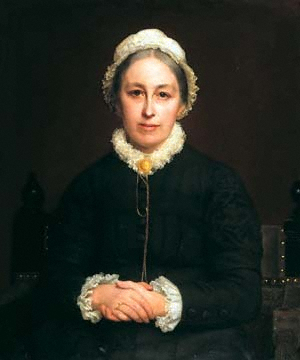Emily Davies facts for kids
Quick facts for kids
Emily Davies
|
|
|---|---|

Emily Davies portrait by Rudolph Lehmann, 1880
|
|
| Born | 22 April 1830 Carlton Crescent, Southampton, England
|
| Died | 13 July 1921 (aged 91) |
| Nationality | British |
| Known for | founder Girton College, Cambridge |
Sarah Emily Davies (born April 22, 1830 – died July 13, 1921) was an important English woman who fought for women's rights. She was a leading voice for women to have the same chances as men to go to university. Emily Davies is best known for helping to start Girton College, Cambridge. This was the first university college in England created to educate women.
Contents
Emily Davies' Early Life
Emily Davies was born in Southampton, England. Her father was a church leader, and her mother was a teacher. Emily spent most of her childhood in Gateshead.
Even when she was young, Emily was interested in helping women. She thought about becoming a doctor. She wrote articles about women in medicine in the English Woman's Journal. She also strongly encouraged her friend Elizabeth Garrett Anderson to study medicine. Elizabeth later became one of the first female doctors in Britain.
Fighting for Women's Rights
After her father passed away in 1862, Emily Davies moved to London. There, she worked on the English Woman's Journal. She also became friends with other women who wanted equal rights, like Barbara Bodichon and Millicent Fawcett.
Emily became a founding member of a group called the Kensington Society. This group included other important women like Elizabeth Garrett Anderson and Frances Mary Buss. Together, they asked the British Parliament to let women vote. However, their request was not successful at that time.
Education for Girls and Women
Emily Davies strongly believed that girls and women should have better education. She worked hard to get girls admitted to official high school exams. She also pushed for women to be allowed into universities like London, Oxford, and Cambridge. Back then, only men could go to these universities.
Emily also joined the movement for women's right to vote, known as suffrage. She helped organize a petition in 1866 for John Stuart Mill, a politician who supported women's rights. This petition, signed by 15,000 people, was the first to ask for women's voting rights. In the same year, she wrote a book called The Higher Education of Women.
Starting Girton College
In 1869, Emily Davies led the effort to create Britain's first college for women. She had help from Frances Buss, Dorothea Beale, and Barbara Bodichon. The college, named Girton College, first opened in Hitchin, Hertfordshire. Charlotte Manning was its first leader. In 1873, the college moved to the edge of Cambridge.
Emily wanted the college to offer the same challenging courses that men studied. Even though the university did not officially let women take the final exams at first, Emily continued to prepare her students for them.
Emily Davies was the leader of Girton College from 1873 to 1875. It wasn't until 1940 that women at Girton and other Cambridge colleges could officially get full university degrees.
Continuing the Fight
Emily's strong efforts for equal education also helped lead to the founding of Newnham College in 1875. This college was led by Anne Jemima Clough. In 1901, Emily Davies received an honorary law degree from the University of Glasgow.
She also kept working for women's voting rights. In 1906, she led a group to Parliament. Emily was known for not agreeing with the more forceful methods used by some parts of the women's suffrage movement, like the Pankhursts. In 1910, she published another book called Thoughts on Some Questions Relating to Women.
Emily Davies passed away at her home in London on July 13, 1921, when she was 91 years old.
Emily Davies' Ideas
Emily Davies believed that education for women should not just be about making them good wives and mothers. She wrote:
Many persons will reply, without hesitation, that the one object to be aimed at, the ideal to be striven after, in the education of women, is to make good wives and mothers. And the answer is a reasonable one, so far as it goes, and with explanations. Clearly, no education would be good which did not tend to make good wives and mothers; and that which produces the best wives and mothers is likely to be the best possible education. But having made this admission, it is necessary to point out that an education of which the aim is thus limited, is likely to fail in that aim.
– Emily Davies, 'The Higher Education of Women , pp. 10–11.
She also said:
What is really wanted in a woman is, that she should be a permanently pleasant companion. So far as education can give or enhance pleasantness, it does so by making the view of life wide, the wit ready, the faculty of comprehension vivid.
Remembering Emily Davies
In 2016, the University of Cambridge decided to name a part of its new development after Emily Davies.
On June 30, 2019, a special Blue Plaque was put up at Girton College. It honors both Emily Davies and Barbara Bodichon. Baroness Hale, a former student of Girton and a top judge, unveiled the plaque. This was part of the college's 150th anniversary celebration. The plaque is on the main tower at the entrance to Girton.
See also

- In Spanish: Emily Davies para niños
 | Jackie Robinson |
 | Jack Johnson |
 | Althea Gibson |
 | Arthur Ashe |
 | Muhammad Ali |

